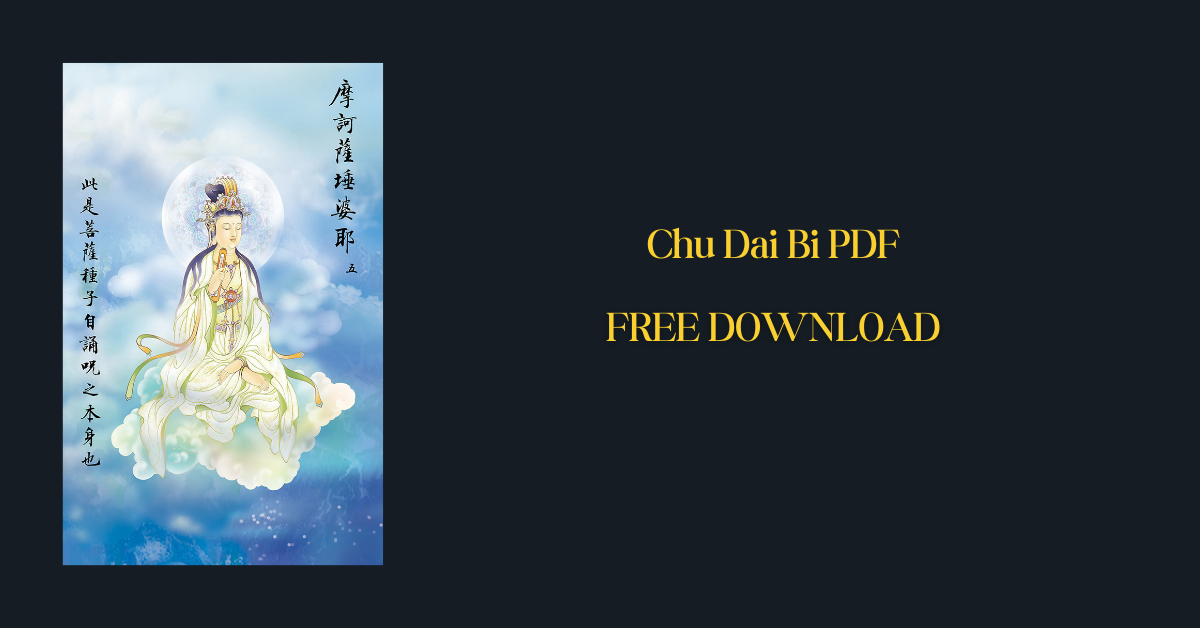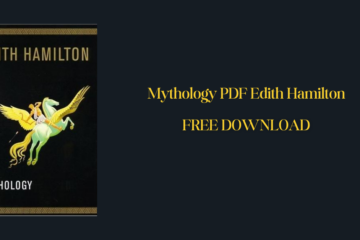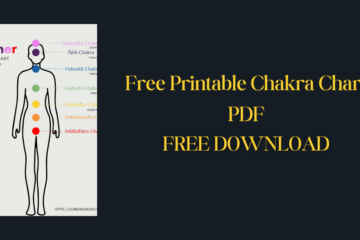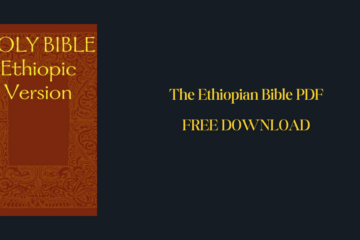The “Chu Dai Bi” mantra, also known as the “Great Compassion Mantra,” is a significant and revered mantra in Buddhism.
It originates from the Mahayana Buddhist tradition and is particularly associated with East Asian Buddhist cultures, such as those in China, Japan, and Korea.
The mantra is chanted to invoke the blessings and compassion of Bodhisattva Avalokiteshvara, known as Kuan Yin or Kannon in various East Asian Buddhist traditions.
| Name of the PDF | chu dai bi pdf |
| Author | |
| No. of pages | 19 |
| Category | Mythology |
| Language | English |
| PDF Link | Click Here |
Also Download
Wilson’s Fourteen Points And The Treaty Of Versailles PDF
Warriors Don’t Cry PDF – Free Download
50 Weapons Of Spiritual Warfare PDF
Meaning and Purposes of the “Chu Dai Bi” Mantra
The “Chu Dai Bi” mantra holds deep meaning and serves multiple purposes within Buddhism and the lives of its practitioners.
Its significance revolves around the themes of compassion, mercy, and spiritual growth. Here is an exploration of the meaning and purposes of the “Chu Dai Bi” mantra:
Compassion and Mercy: At its core, the mantra emphasizes compassion and mercy. It is a supplication to Bodhisattva Avalokiteshvara (Kuan Yin or Kannon), who embodies boundless compassion for all sentient beings. Chanting “Chu Dai Bi” is a way of invoking and connecting with this compassionate energy, reminding practitioners to cultivate these qualities in their own lives.
Alleviating Suffering: One of the primary purposes of chanting “Chu Dai Bi” is to alleviate suffering, whether physical, emotional, or spiritual. Practitioners believe that by reciting the mantra with sincerity and devotion, they can seek relief from physical ailments, emotional distress, and the suffering that arises from attachment and negative emotions.
Protection and Guidance: The mantra is often used as a source of protection and guidance. It is believed to act as a spiritual shield, safeguarding practitioners from harm, both physical and spiritual. Many people chant “Chu Dai Bi” before embarking on journeys, facing challenges, or when they feel vulnerable.
Spiritual Growth: Chanting “Chu Dai Bi” is also a form of spiritual practice and personal growth. It helps individuals develop mindfulness and concentration as they focus on the mantra’s syllables and meaning. The mantra encourages practitioners to look within, reflect on their own actions, and strive for self-improvement in alignment with compassionate principles.
Cultivating Inner Peace: The rhythmic repetition of the mantra can have a calming and centering effect on the mind. It aids in reducing mental clutter and promoting inner peace, making it a valuable tool for meditation and mindfulness practices.
Connecting with Bodhisattva Avalokiteshvara: Devotees believe that by chanting “Chu Dai Bi,” they establish a spiritual connection with Bodhisattva Avalokiteshvara, who then offers guidance, blessings, and assistance in times of need.
Cultural and Religious Significance: The mantra has deep cultural and religious significance in East Asian Buddhist traditions. It is often recited during religious rituals, ceremonies, and festivals, underscoring its importance in preserving and transmitting Buddhist teachings.
Structure of the “Chu Dai Bi” Mantra
The “Chu Dai Bi” mantra has a structured and rhythmic composition. The mantra consists of a series of syllables and words, and its structure plays a significant role in its chanting and meditative practice. Below is an overview of the typical structure of the “Chu Dai Bi” mantra:
Namo: The mantra often begins with the word “Namo,” which is a reverential term used to show respect and devotion. It can be translated as “homage to” or “I take refuge in.”
Amitabha: Following “Namo,” the mantra frequently includes the name “Amitabha.” Amitabha is one of the most well-known Buddhas in Mahayana Buddhism, associated with the Pure Land tradition. Including Amitabha’s name in the mantra may symbolize the aspiration to attain rebirth in his Pure Land, which is considered a realm of enlightenment.
Chu Dai Bi: The heart of the mantra lies in the phrase “Chu Dai Bi,” which is the transliteration of the Sanskrit mantra “Om Mani Padme Hum.” Each of these syllables holds its own significance:
- Om: Om is a sacred and universal sound in many Eastern spiritual traditions. It represents the essence of ultimate reality or the universe and is often used to begin and end mantras.
- Mani: This syllable represents the jewel, symbolizing the compassion and wisdom that one can attain through the practice of the mantra.
- Padme: Padme means “lotus.” The lotus is a symbol of purity and spiritual growth, signifying the journey from impurity to enlightenment.
- Hum: Hum represents indivisibility and the union of wisdom and compassion, essential aspects of the Buddhist path.
Quan Yin: The mantra often concludes with “Quan Yin,” referring to Bodhisattva Avalokiteshvara. Quan Yin is the embodiment of compassion and mercy, and invoking her name through the mantra seeks her blessings and guidance.
“Chu Dai Bi” in Daily Practice
“Chu Dai Bi” holds a special place in the daily spiritual practice of many Buddhists and individuals seeking to incorporate Buddhist teachings into their lives.
Its repetitive chanting and focus on compassion make it a valuable tool for personal growth and spiritual development. Here’s how “Chu Dai Bi” can be integrated into daily practice:
- Morning Chanting: Many people start their day by reciting the “Chu Dai Bi” mantra as a way to set a compassionate and peaceful tone for the day ahead. Chanting in the morning can help clear the mind, foster a sense of inner calm, and invoke the blessings of Bodhisattva Avalokiteshvara for guidance and protection throughout the day.
- Meditation and Mindfulness: “Chu Dai Bi” can be incorporated into meditation and mindfulness practices. As practitioners chant the mantra, they focus their attention on each syllable, allowing it to anchor their awareness in the present moment. This can be especially helpful for those seeking to develop concentration and deepen their meditation experience.
- Stress Reduction: Chanting “Chu Dai Bi” during moments of stress or anxiety can be highly effective. The rhythmic repetition of the mantra can have a calming effect on the mind, helping individuals manage stress and regain emotional balance.
- Spiritual Reflection: The mantra encourages practitioners to reflect on the principles of compassion and mercy. Incorporating “Chu Dai Bi” into daily practice offers an opportunity for self-examination, fostering a sense of empathy and kindness towards others.
- Healing and Well-Being: Some people use the mantra for healing purposes, both physical and emotional. They believe that the compassionate energy invoked through the mantra can contribute to their overall well-being and aid in recovery from illness or emotional turmoil.
- Protection: Chanting “Chu Dai Bi” before embarking on journeys or facing challenging situations is a common practice to seek protection and guidance. It is believed to act as a spiritual shield, offering a sense of security and support.
- Family and Community Rituals: “Chu Dai Bi” is often chanted during family or community rituals and ceremonies. It can be a unifying practice that brings people together to express their devotion, compassion, and sense of shared purpose.
- Bedtime Chanting: Some individuals choose to recite the mantra before bedtime as a way to conclude the day with thoughts of compassion and mercy. This can help promote restful sleep and create a peaceful mental state before sleeping.
- Acts of Compassion: Beyond chanting, “Chu Dai Bi” inspires individuals to engage in acts of compassion and mercy in their daily lives. Practitioners may actively seek opportunities to help others, alleviate suffering, and make a positive impact on the world.
Variations and Adaptations of “Chu Dai Bi”
“Chu Dai Bi” has been transmitted across various Buddhist traditions and cultures, leading to a variety of variations and adaptations.
These variations may include changes in pronunciation, additional syllables, or different ways of chanting while maintaining the core message of compassion and mercy.
Here are some notable variations and adaptations of the “Chu Dai Bi” mantra:
Sanskrit Variants: The original Sanskrit version of the mantra is “Om Mani Padme Hum.” In some traditions, practitioners may chant the mantra in its Sanskrit form. While the pronunciation differs from “Chu Dai Bi,” the essence and meaning of the mantra remain the same.
Chinese Pronunciations: Within Chinese Buddhism, there are multiple pronunciations of the mantra, reflecting regional dialects and historical adaptations. For example, in Mandarin Chinese, the mantra is often pronounced as “Namo Amituofo Chu Dari Bi Guanshiyin Pusa,” incorporating the names of Amitabha Buddha and Bodhisattva Avalokiteshvara.
Korean Adaptations: In Korean Buddhism, the “Chu Dai Bi” mantra is known as the “Dabeop” or “Dari Beot” mantra. The pronunciation and intonation may differ from the Chinese versions, reflecting the Korean language and pronunciation.
Japanese Pronunciations: In Japan, where the mantra is associated with the Bodhisattva Kannon (Kuan Yin), variations in pronunciation and chanting styles exist. For example, the mantra can be chanted as “Namu Kanzeon Bosatsu,” emphasizing the reverence for Kannon.
Tibetan Mantra: In Tibetan Buddhism, the mantra is recited as “Om Mani Peme Hung.” The Tibetan version is known for its distinctive pronunciation and is often incorporated into various practices, including the popular “Om Mani Padme Hung” prayer wheel.
Extended Versions: Some adaptations include extended versions of the mantra, with additional phrases or blessings. These extended versions may be chanted in rituals, ceremonies, or during special occasions to invoke specific blessings or benefits.
Musical Chanting: In some Buddhist traditions, the “Chu Dai Bi” mantra is chanted in a musical or melodic manner, adding a harmonious element to the practice. This style of chanting can enhance the meditative and devotional experience.
Modern Adaptations: In contemporary contexts, practitioners may create modern adaptations of the mantra, incorporating it into musical compositions, art, or mindfulness practices. These adaptations aim to make the mantra more accessible to a broader audience.
Interfaith and Secular Use: Beyond Buddhist contexts, the mantra has found its way into interfaith and secular settings. Individuals from various spiritual backgrounds may chant “Chu Dai Bi” as a universal expression of compassion and inner peace.
Conclusion
The “Chu Dai Bi” mantra, also known as the “Great Compassion Mantra,” holds a special place within Buddhism and has a significant impact on the lives of its practitioners.
This mantra, with its profound message of compassion and mercy, transcends linguistic and cultural boundaries, resonating with people from various backgrounds and traditions.
It serves as a powerful reminder of the essential Buddhist principles of compassion, empathy, and the alleviation of suffering.
By invoking the blessings of Bodhisattva Avalokiteshvara, practitioners seek to cultivate these qualities within themselves, fostering personal growth and spiritual development.
FAQs
What is the “Chu Dai Bi” mantra?
The “Chu Dai Bi” mantra, also known as the “Great Compassion Mantra,” is a revered Buddhist mantra originating from the Mahayana Buddhist tradition. It emphasizes compassion and mercy and is often chanted to invoke the blessings of Bodhisattva Avalokiteshvara (Kuan Yin or Kannon).
What is the meaning of “Chu Dai Bi”?
“Chu Dai Bi” represents the transliteration of the Sanskrit mantra “Om Mani Padme Hum.” Each syllable has a specific meaning: Om represents the essence of ultimate reality, Mani signifies the jewel of compassion and wisdom, Padme means lotus, symbolizing purity, and Hum represents the union of wisdom and compassion.
How do I pronounce “Chu Dai Bi”?
Pronunciation may vary depending on the tradition and language. The most common Mandarin Chinese pronunciation is “Chu Dai Bi,” while in Japanese, it may be “Namu Kanzeon Bosatsu.” In Tibetan, it’s “Om Mani Peme Hung.”
What are the benefits of chanting “Chu Dai Bi”?
Chanting “Chu Dai Bi” is believed to have several benefits, including promoting compassion, alleviating suffering, fostering inner peace, and offering protection. It can also be used for healing and spiritual growth.
Can anyone chant “Chu Dai Bi”?
Yes, anyone can chant “Chu Dai Bi.” It is not limited to Buddhists and can be practiced by individuals of various spiritual backgrounds or even those seeking a sense of inner peace and compassion.
How should I incorporate “Chu Dai Bi” into my daily practice?
You can incorporate the mantra into your daily practice by chanting it in the morning, during meditation, in times of stress, or before bedtime. You can also use it as a tool for reflection and acts of compassion in your daily life.
Are there variations of the “Chu Dai Bi” mantra?
Yes, there are variations and adaptations of the mantra across different Buddhist traditions and cultures. These variations may include changes in pronunciation, additional syllables, or different ways of chanting while preserving the core message of compassion and mercy.
Is there a specific way to chant “Chu Dai Bi”?
Chanting practices may vary, but generally, you should chant it with sincerity and focus. Pay attention to proper pronunciation and rhythm. You can chant it silently or audibly, depending on your preference.
Can I chant “Chu Dai Bi” for healing purposes?
Many people chant “Chu Dai Bi” for healing, believing that the compassionate energy it invokes can contribute to physical and emotional well-being. However, it’s important to remember that it is not a replacement for medical treatment.
Is there a specific time or place to chant “Chu Dai Bi”?
You can chant “Chu Dai Bi” at any time and in any peaceful setting that suits your practice. Some people have dedicated spaces or altars for chanting, but it is not mandatory.

Niketa Mulay, a seasoned content writer and editor, has over a decade of experience. With a Master’s in Journalism, she honed her skills at The Times of India and now freelances across various industries. Passionate about reading, writing, and scuba diving, she shares expert PDF guides and tips at PDFdrivehub.com.




